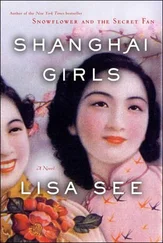Lisa See - Peony in Love
Здесь есть возможность читать онлайн «Lisa See - Peony in Love» весь текст электронной книги совершенно бесплатно (целиком полную версию без сокращений). В некоторых случаях можно слушать аудио, скачать через торрент в формате fb2 и присутствует краткое содержание. Жанр: Старинная литература, на английском языке. Описание произведения, (предисловие) а так же отзывы посетителей доступны на портале библиотеки ЛибКат.
- Название:Peony in Love
- Автор:
- Жанр:
- Год:неизвестен
- ISBN:нет данных
- Рейтинг книги:4 / 5. Голосов: 1
-
Избранное:Добавить в избранное
- Отзывы:
-
Ваша оценка:
- 80
- 1
- 2
- 3
- 4
- 5
Peony in Love: краткое содержание, описание и аннотация
Предлагаем к чтению аннотацию, описание, краткое содержание или предисловие (зависит от того, что написал сам автор книги «Peony in Love»). Если вы не нашли необходимую информацию о книге — напишите в комментариях, мы постараемся отыскать её.
Peony in Love — читать онлайн бесплатно полную книгу (весь текст) целиком
Ниже представлен текст книги, разбитый по страницам. Система сохранения места последней прочитанной страницы, позволяет с удобством читать онлайн бесплатно книгу «Peony in Love», без необходимости каждый раз заново искать на чём Вы остановились. Поставьте закладку, и сможете в любой момент перейти на страницу, на которой закончили чтение.
Интервал:
Закладка:
This is why men visit the outside realm, while women remain inside.”
The matchmaker nodded thoughtfully and then asked to see Yi. During the time it took for a single candle to burn down, Yi was brought in and inspected, a dowry was negotiated, and a possible bride-price discussed. Master Qian was willing to give five percent of his silk crop for five years, plus one mou of land. In addition, the girl would go to her new home with several trunks of bed linens, shoes, clothes, and other embroideries—all silk, all made by the bride.
How could the matchmaker not be impressed?
“It is often better for a wife to come from less standing and wealth so that she will more easily adjust to her new position as daughter-in-law in her husband’s home,” she observed.
When the matchmaker returned to Hangzhou, she went directly to the Wu compound. “I have found a wife for your son,” she announced to Madame Wu. “Only a man who has already lost two wives would be willing to take her.” The two women studied the times of birth for Ren and Yi and compared their horoscopes, making sure the Eight Characters were well matched. They discussed what a bride-price might be, considering that the father was only a farmer. Then the matchmaker went back to Gu-
( 2 2 8 )
dang. She delivered silver, jewelry, four jars of wine, two bolts of cloth, some tea, and a leg of mutton to seal the agreement.
Ren and Qian Yi married in the twenty-sixth year of Emperor Kangxi’s reign. Yi’s father was relieved to be rid of his unwanted and useless daughter; her mother smiled at the reversal of fortune for her natal family line.
I had many words of advice I wanted to give Yi, but at the moment of parting I let her mother do the talking.
“Be respectful and cautious,” she advised. “Be diligent. Go to bed late and wake up early as you’ve always done. Make tea for your mother-in-law and treat her kindly. If they have domestic animals, feed them. Take good care of your feet, arrange your clothes, and comb your hair. Never be angry. If you do these things, you will have a good name.”
She held her daughter in her arms.
“One more thing,” she said gently. “This has happened very fast and we can’t be sure the matchmaker has been completely forthright. If your husband turns out to be poor, don’t blame him. If he has a clubfoot or is sim-pleminded, don’t complain, become disloyal, or change your heart. You now have no one to rely on but him. The water is spilled and you can’t take it back. Contentment is just a matter of chance.” Tears streamed down her face. “You’ve been a good daughter. Try not to forget us entirely.”
Then she pulled the opaque red veil down over Yi’s face and helped her into the palanquin. A small band played, and the local feng shui man tossed grains, beans, small fruit, and copper cash to propitiate baleful spirits. But I could see there were none of those, only me, happy, and village children who scrambled for the corporeal treats to take home. Yi, who had no choice in any of this, left her home village. She had little expectation of love or affection, but she carried her mother’s bravery in her heart.
Ren’s mother greeted the palanquin at the front gate. She couldn’t see the girl’s face, but she inspected her feet and found them more than adequate. The two of them swayed together through the compound to the bedchamber. Here, Madame Wu placed the confidential book in her daughter-in-law’s hands. “Read this. It will tell you what you need to do tonight. I look forward to a grandson in nine months.”
Hours later, Ren arrived. I watched him lift Yi’s veil and smile at the beautiful girl. He was pleased. I wished for them the Three Abundances—
good fortune, long life, and sons—and then I left.
I wasn’t going to make the same mistakes I’d made with Ze. I wouldn’t live in Ren and Yi’s bedchamber, where I might be tempted to interfere in ways I had in the past. I remembered how Liniang had been drawn to the ( 2 2 9 )
plum tree she’d seen in the garden: I should count it a great good fortune to be buried beside it when I die. There she thought she might marshal her fragrant spirit through the dark rains of summer and keep company with the tree’s roots. When she died, her parents honored her wishes. Later, Sister Stone put a sprig of flowering plum in a vase and placed it on Liniang’s altar.
Liniang’s ghost had responded by sending a shower of plum petals. I went to the Wus’ plum tree, which hadn’t bloomed or borne fruit since I died.
Its neglect suited me. I made a home for myself beneath the moss-covered rocks that surrounded the tree’s trunk. From here, I’d be able to watch over Yi and Ren without intruding too much.
y i adap te d qu i c k ly to being a wife. She had more wealth now than she ever could have imagined, but she showed no signs of extravagance.
From childhood she’d sought inner calm, not outer beauty. Now, as a wife, she strove to be much more than just a pretty dress. Her charm was completely her own: Her skin was smoother than jade, each step she took with her lily feet was so dainty it seemed to cause other flowers to bloom, and her swaying gait was so soft that her skirts swirled about her like mist.
She never complained, not even when loneliness for her mother overpowered her. At those times—instead of crying, yelling at the servants, or throwing a cup—she spent the day sitting at a northern window, practicing being quiet, with nothing but a single incense burner—and me—to keep her company.
She learned to love Ren and respect Madame Wu. There were no conflicts in the women’s rooms, because Yi did all possible things to make her mother-in-law happy. Nor did Yi complain about the women who had preceded her. She didn’t taunt us for dying so young. She didn’t try to hurt the dignity of our memories. She preferred instead to entertain her husband and mother-in-law with her singing, dancing, and zither playing, and they enjoyed her innocence and lively manner. Her heart was like a great road with room for everyone. She treated the servants well, always had kind words for the cook, and dealt with tradesmen as though they were her kinsmen. For all this, she was appreciated by her mother-in-law and doted on by her husband. She had good food to eat, embroidered clothes to wear, and a much better house in which to live. However, she was not yet educated enough for this household. Now that I had access to Ren’s library, I could teach her properly. But I was not alone in my efforts.
I remembered back to how my father taught me to read and under-
( 2 3 0 )
stand, so one day I pushed Yi into Ren’s lap. Beguiled by Yi’s innocence and sincerity, Ren helped her by asking about her reading, forcing her to think and criticize. Yi became a conduit between Ren and me. In our education of her, we were one. She grew to be more than proficient in the classics, literature, and mathematics. Ren and I took pride in her growing knowledge and accomplishments.
But some skills still evaded her. Yi continued to hold her calligraphy brush awkwardly, causing her strokes to be shaky and unsure. Madame Wu stepped in, and through her I drilled Yi on all the lessons Fifth Aunt had taught me, using Pictures of Battle Formations of the Brush; Yi improved just as I had all those years ago. When she sometimes recited poems like a parrot with no sense of their deeper meanings, I knew my efforts still weren’t enough. I remembered Ren’s cousin. I went out and brought Li Shu home, and she became Yi’s tutor. Now when Yi recited, she opened our hearts to the Seven Emotions and transported us to remembered and imagined places. Everyone in the household grew to love her even more.
Not once did I feel jealous, not once did I want to eat Yi’s heart or pull off her head and limbs for Ren to find, and not once did I try to reveal myself to her or visit her in her dreams. But by now I could do almost anything, so when they woke in the morning, I cooled the water they splashed on their faces. When Yi did her hair, I became the teeth in the comb, ef-fortlessly separating each snarl, tangle, and strand. When Ren went out, I cleared his passage, pushed aside obstacles, eliminated dangers, and brought him home safely. During the dog days of summer, I enticed a servant to tie a watermelon in netting and lower it into the well. Then I went down into the darkness, seeped into the water, and chilled it even more. I loved watching Ren and Yi eat the melon after dinner, enjoying its refresh-ing qualities. In all these ways I thanked my sister-wife for being good to my husband and Ren for finding happiness and companionship after so many lonely years. But these were minor things.
Читать дальшеИнтервал:
Закладка:
Похожие книги на «Peony in Love»
Представляем Вашему вниманию похожие книги на «Peony in Love» списком для выбора. Мы отобрали схожую по названию и смыслу литературу в надежде предоставить читателям больше вариантов отыскать новые, интересные, ещё непрочитанные произведения.
Обсуждение, отзывы о книге «Peony in Love» и просто собственные мнения читателей. Оставьте ваши комментарии, напишите, что Вы думаете о произведении, его смысле или главных героях. Укажите что конкретно понравилось, а что нет, и почему Вы так считаете.












